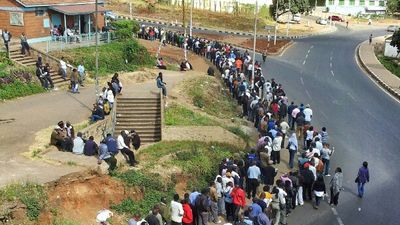Kenyan Political Tongues
As the Kenyan elections heat up, we look at the hip hop artists representing the voices of the people.
Kenyans in line to vote on March 4, 2013. *photo by Truthslinger
Kenya is a nation at a crossroads at the moment, facing the most important election in its history. Not only is it the most contested election by top political opponents but it is also the first election under Kenya's new constitution that stresses the need for devolution. That constitution itself took over 20 years to write amidst constant struggle with the status quo protectionist government under the leadership of Daniel Arap Moi, who strong-ruled over Kenya for over 24 unforgettable years. His time to relinquish power came in 2002 and ever since then Kenya's political story has been one of keen interest even to an average onlooker. In 2007 the sins of Kenya's past politicians came blowing up in the faces of the regular citizens as they took their fights to the streets and villages. To cut the long story short, Kenya is a politically charged place.
*photo by @Truthslinger
In a country with a lot of political expression and interest, musicians rightfully raise their voices in an attempt to get their message heard. Although the most popular musicians in the country have chosen to be quiet about politics, the underground has been taking shots at the political elite. Some hungrier and less creative artists have taken the regular route of taking money to sing praises for certain political figures and even opting to lose a few fans with such moves. Kenya has political freedom of expression, so there's nothing wrong with artists taking a political side. But some more aware artists have used their creativity to address some of the issues that have been troubling the society at large. Late last year Kenya's top rising rapper Octopizzo dropped a song called "Toboa."
[embed width="620"]
'Toboa' means 'reveal' and it suggests that politicians caused Kenyans to fight in 2007 but then hid in their big mansions while the hacking went on. He merges with the smooth neo-soul voice of artist Anto Mwangi to deliver a straight-faced attack on the elite for their greed. Octopizzo comes from one of most politically volatile slums in Kenya, Kibera, and he saw the fighting first hand. On the song he calls out politicians and asks young people to vote for change. He also educates the youth on the importance of protecting their vote and the need to be educated about the politics of their country. He leaves the song with an important word “It's so simple, nobody will bring change to your doorstep, change begins with you. These people are not voting for us, we're voting for them so make the right choices don't forget what happened in 2007”.
Another artist to come out vocally against politicians is Mombasa-born, Nakuru-bred underground hip hop artist Jemedari (above), who just released the video to “Letter to the President”. On the song he addresses issues that politicians in Kenya avoid all day. “Police killing, murders and drug-dealings/ IDPs living in rooms with no ceilings/ MPs rolling in Millis with no feelings/ Teachers, Doctors striking for more pay but money gets wasted every day”. Jemedari, which means 'the General', has always been the kind of artist that's been inspired by the urge to speak political messages. “I felt frustrated by the kind of leadership that Kenya has and because I'm a voice of the voiceless I necessitated the letter in order for someone to hear the plea of the people on the ground. I hope they're listening,” says Jemedari.
[embed width="620"]
Underground hip hop veteran Muki Garang, named after the first black leader of independent South Sudan, is known as a revolutionary Kenyan poet and for dropping hard-hitting songs against the wrongs of the establishment. Kenyans remember him from the song "Justice", based on the unjust release of a grandson son of a white farmer of colonial heritage in Kenya after he was accused of murdering a black trespasser on his farm. The case created heated emotion in Kenya and the song faults many government officers, especially the then Attorney General Amos Wako. The song's video was even banned on TV. He recently released a song called "A Dollar a Day" (below) that explores the poverty of regular Africans while politicians spend millions on their political campaigns. The song features community activist Muki Garang, whose work can be found here.
[embed width="620"]
All of these artists represent a growing number of younger Kenyan artists that are fed up and are speaking out against injustice and corruption in Kenya. It may seem that the older generation is quiet, but that may be because they are so used to being oppressed. With more awareness and knowledge of their rights, the young generation will not take it laying down. The general mode of thinking has reached a new era, but it does require the leaders to hear the anger of the people to effect change. As Kenya begins a new switch in political chairs, we all know that there will still be political intrigue. They should bear in mind that there's a new generation of artists that is watching their every move.
Written by OKA contributor Buddha Blaze.
*photo by Truthslinger.
